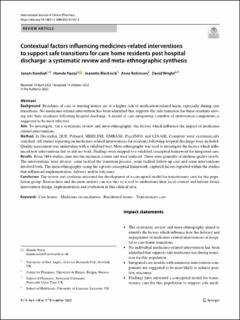| dc.contributor.author | Kandiah, Janani | |
| dc.contributor.author | Nazar, Hamde | |
| dc.contributor.author | Blacklock, Jeanette | |
| dc.contributor.author | Robinson, Anna | |
| dc.contributor.author | Wright, David John | |
| dc.date.accessioned | 2023-01-04T11:39:57Z | |
| dc.date.available | 2023-01-04T11:39:57Z | |
| dc.date.created | 2022-12-06T13:51:41Z | |
| dc.date.issued | 2022 | |
| dc.identifier.issn | 2210-7703 | |
| dc.identifier.uri | https://hdl.handle.net/11250/3040900 | |
| dc.description.abstract | Background
Residents of care or nursing homes are at a higher risk of medication-related harm, especially during care transitions. No medicines-related intervention has been identified that supports the safe transition for these residents moving into their residence following hospital discharge. A model of care integrating a number of intervention components is suggested to be most effective
Aim
To investigate, via a systematic review and meta-ethnography, the factors which influence the impact of medicines related interventions.
Method
In December 2020, Pubmed, MEDLINE, EMBASE, PsycINFO, and CINAHL Complete were systematically searched. All studies reporting on medicines-related interventions for residents following hospital discharge were included. Quality assessment was undertaken with a validated tool. Meta-ethnography was used to investigate the factors which influenced how interventions did, or did not work. Findings were mapped to a validated conceptual framework for integrated care.
Results
From 3884 studies, nine met the inclusion criteria and were analysed. These were generally of medium quality (n = 6). The interventions were diverse: some tackled the transition process, some tackled follow-up care and some interventions involved both. The meta-ethnography, using the a priori conceptual framework, captured factors reported within the studies that influenced implementation, delivery and/or outcomes.
Conclusion
The review and synthesis informed the development of a conceptual model for transitionary care for this population group. Researchers and decision-makers can use this as a tool to understand their local context and inform future intervention design, implementation and evaluation in this clinical area. | en_US |
| dc.language.iso | eng | en_US |
| dc.publisher | Springer | en_US |
| dc.rights | Navngivelse 4.0 Internasjonal | * |
| dc.rights.uri | http://creativecommons.org/licenses/by/4.0/deed.no | * |
| dc.title | Contextual factors influencing medicines-related interventions to support safe transitions for care home residents post hospital discharge: a systematic review and meta-ethnographic synthesis | en_US |
| dc.type | Journal article | en_US |
| dc.type | Peer reviewed | en_US |
| dc.description.version | publishedVersion | en_US |
| dc.rights.holder | Copyright 2022 The Author(s) | en_US |
| cristin.ispublished | true | |
| cristin.fulltext | original | |
| cristin.qualitycode | 1 | |
| dc.identifier.doi | 10.1007/s11096-022-01507-3 | |
| dc.identifier.cristin | 2089452 | |
| dc.source.journal | International Journal of Clinical Pharmacy | en_US |
| dc.identifier.citation | International Journal of Clinical Pharmacy. 2022. | en_US |

